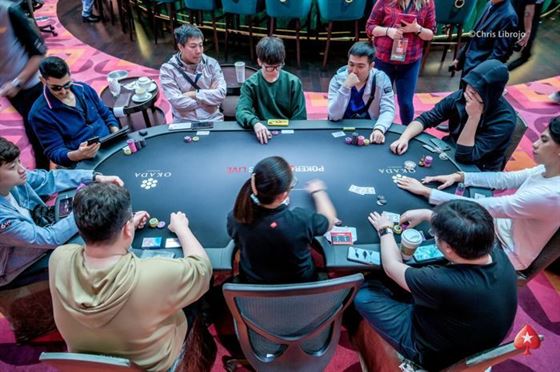From Beginner to Champion: Navigating the Poker Tournament Circuit is a comprehensive guide that aims to help poker players of all skill levels navigate the competitive world of poker tournaments. Whether you are a beginner looking to learn the basics or an experienced player seeking to improve your strategies, this guide provides valuable insights and practical advice to help you succeed in the poker tournament circuit. With a focus on both the technical aspects of the game and the mental and psychological aspects of tournament play, this guide offers a well-rounded approach to help you elevate your game and become a champion in the world of poker tournaments.
The Basics: Understanding the Poker Tournament Circuit
First and foremost, it is important to understand what a poker tournament is. Unlike cash games where players can come and go as they please, tournaments have a fixed start time and all players begin with the same number of chips. The goal is to accumulate as many chips as possible and ultimately be the last player standing. Tournaments can vary in size, from small local events to massive international competitions with thousands of participants.
To participate in a poker tournament, you will need to pay a buy-in fee. This fee goes into the prize pool, which is then distributed among the top finishers. The buy-in fee can range from a few dollars to thousands of dollars, depending on the tournament’s prestige and level of competition. It is important to carefully consider your bankroll and skill level before deciding on which tournaments to enter.
Once you have registered for a tournament, it is time to familiarize yourself with the different formats commonly found in the poker tournament circuit. The most popular format is the freezeout, where players are eliminated once they run out of chips. Another common format is the rebuy tournament, where players have the option to buy more chips if they bust out early. Additionally, there are knockout tournaments, where players receive a cash prize for eliminating other players, and satellite tournaments, which offer a chance to win a seat in a larger, more prestigious event.
Understanding the structure of a tournament is crucial for success. Tournaments are divided into levels, with each level lasting a predetermined amount of time. As the levels progress, the blinds and antes increase, putting pressure on players to accumulate chips or risk being blinded out. It is important to adjust your strategy accordingly, playing more aggressively as the blinds increase to avoid being left behind.
In addition to the structure, it is essential to be aware of the different stages of a tournament. The early stages are characterized by deep stacks and a slower pace, allowing for more strategic play. As the tournament progresses, the middle stages see the average stack size decrease, leading to more aggressive play and frequent confrontations. Finally, the late stages are where the pressure is at its highest, with players vying for a spot at the final table and a shot at the top prize.
To succeed in the poker tournament circuit, it is crucial to develop a solid strategy and continuously improve your skills. This involves studying the game, analyzing your opponents’ tendencies, and making informed decisions based on the information available. Additionally, managing your bankroll and being disciplined in your approach will help you navigate the ups and downs of tournament play.
Strategies for Success in the Poker Tournament Circuit
First and foremost, it is crucial to understand the importance of bankroll management. Poker tournaments can be expensive, with buy-ins ranging from a few dollars to thousands. As a beginner, it is essential to start with smaller buy-ins to gain experience and build your bankroll. It is recommended to allocate no more than 2-5% of your total bankroll for each tournament. This way, even if you experience a string of losses, you will still have enough funds to continue playing.
Another key strategy is to study and understand the different tournament formats. There are various types of poker tournaments, including freezeouts, rebuys, and satellites. Each format requires a different approach and strategy. Freezeouts, for example, do not allow players to rebuy or add-on chips, making it crucial to conserve your chips and play cautiously. On the other hand, rebuy tournaments allow players to purchase additional chips if they bust out, giving you more opportunities to take risks and accumulate chips.
Furthermore, it is essential to be aware of your table position and adjust your strategy accordingly. In the early stages of a tournament, when the blinds are low, it is advisable to play tight and conservative. Focus on playing premium hands and avoid unnecessary risks. As the tournament progresses and the blinds increase, you will need to become more aggressive and take calculated risks to accumulate chips. Position yourself to steal blinds and antes whenever possible, as this can significantly increase your chip stack.
In addition to understanding tournament formats and adjusting your strategy based on your table position, it is crucial to pay attention to your opponents’ playing styles. Poker is a game of observation and deduction. Take note of how your opponents play their hands, their betting patterns, and their reactions to different situations. This information can be invaluable in making informed decisions and gaining an edge over your opponents. Adapt your strategy accordingly, exploiting the weaknesses and tendencies of your opponents.
Lastly, mental fortitude is a vital aspect of success in the poker tournament circuit. Tournaments can be long and grueling, requiring hours of intense concentration and decision-making. It is crucial to stay focused and avoid tilt, which is a state of emotional frustration that can lead to poor decision-making. Take breaks when needed, practice mindfulness techniques, and maintain a positive mindset. Remember that poker is a game of variance, and even the best players can experience bad beats. Stay disciplined and trust in your skills and strategy.
Mastering the Mindset: Mental Preparation for Poker Tournaments
One of the first things to understand about poker tournaments is that they can be mentally and emotionally demanding. The pressure of playing for high stakes, the constant decision-making, and the unpredictability of the game can all take a toll on your mental state. That’s why it’s crucial to develop a strong mindset that can withstand the challenges that come with tournament play.
One of the most important aspects of mental preparation is managing your emotions. It’s natural to feel a range of emotions during a poker tournament, from excitement and confidence to frustration and disappointment. However, allowing these emotions to cloud your judgment can be detrimental to your performance. That’s why it’s essential to learn how to stay calm and composed, regardless of the outcome of each hand. This can be achieved through techniques such as deep breathing, visualization, and positive self-talk.
Another crucial aspect of mental preparation is maintaining focus and concentration. In a poker tournament, there are numerous distractions that can divert your attention away from the game. Whether it’s the noise and chatter of other players, the pressure of the crowd, or even your own thoughts and worries, staying focused can be a challenge. To combat this, it’s important to develop strategies that help you stay present and engaged in the game. This can include techniques such as mindfulness meditation, creating a pre-game routine, or using mental imagery to visualize success.
In addition to managing emotions and maintaining focus, mental preparation also involves developing a resilient mindset. Poker tournaments are filled with ups and downs, and it’s crucial to be able to bounce back from setbacks and losses. This requires a mindset that is resilient and adaptable, able to learn from mistakes and make adjustments as needed. It’s important to remember that even the best players in the world experience losses, and it’s how you respond to those losses that will ultimately determine your success.
Finally, mental preparation also involves setting realistic goals and expectations for yourself. While it’s natural to aspire to win every tournament you enter, it’s important to recognize that poker is a game of skill and luck. Setting unrealistic expectations can lead to frustration and disappointment, which can negatively impact your performance. Instead, focus on setting process-oriented goals, such as making good decisions and playing your best game. By doing so, you can maintain a positive mindset and continue to improve your skills, regardless of the outcome of each tournament.
Navigating Different Poker Tournament Formats in the Circuit
The most common format you’ll come across is the freezeout tournament. In this format, each player starts with a set number of chips, and once they run out, they are eliminated from the tournament. The last player standing is declared the winner. Freezeout tournaments are straightforward and provide a level playing field for all participants. However, they require a solid strategy and careful bankroll management, as there is no opportunity to rebuy or add-on chips.
Another popular format is the rebuy tournament. In rebuy tournaments, players have the option to rebuy additional chips if they bust out during a specified rebuy period. This format allows players to stay in the game even after losing their initial stack, giving them a chance to make a comeback. Rebuy tournaments can be more aggressive and fast-paced, as players are willing to take more risks knowing they can buy back in. It’s important to have a clear rebuy strategy and be mindful of your bankroll to maximize your chances of success in these tournaments.
For those seeking a more relaxed and social atmosphere, the shootout tournament format may be the way to go. In shootout tournaments, players are divided into multiple tables, and the winner of each table advances to the next round. This process continues until there is only one table left, and the winner of that table is crowned the champion. Shootout tournaments require a different approach, as you’ll be playing against a new set of opponents at each table. Adapting to different playing styles and adjusting your strategy accordingly is crucial in shootout tournaments.
If you’re looking for a format that offers more flexibility, the satellite tournament is worth considering. Satellite tournaments give players the opportunity to win a seat in a higher-stakes tournament by finishing in a specified position. For example, a satellite tournament may award seats to a major poker event to the top three finishers. These tournaments are a cost-effective way to gain entry into larger tournaments and potentially win big. However, they can be highly competitive, as many players are vying for a limited number of seats.
Lastly, the multi-table tournament (MTT) format is a staple in the poker tournament circuit. MTTs feature a large number of players and multiple tables, with players gradually being eliminated as the tournament progresses. MTTs require endurance, as they can last for several hours or even days. Having a solid understanding of tournament strategy, including when to be aggressive and when to be more conservative, is essential in MTTs.
From Beginner to Champion: Tips for Advancing in the Poker Tournament Circuit
The first step in advancing in the poker tournament circuit is to master the basics of the game. This means understanding the rules, hand rankings, and different variations of poker. It is essential to have a solid foundation before diving into the competitive world of tournaments. Take the time to study the game, read books, watch tutorials, and practice playing with friends or online. The more you familiarize yourself with the game, the better equipped you will be to make informed decisions at the table.
Once you have a good grasp of the game, it is time to start playing in low-stakes tournaments. These tournaments are a great way to gain experience and build your bankroll without risking too much. It is important to approach these tournaments with a strategic mindset. Pay attention to your opponents’ playing styles, observe their betting patterns, and adapt your strategy accordingly. Remember, poker is not just about the cards you are dealt; it is also about how you play them.
As you gain more experience and confidence, it is time to start participating in higher-stakes tournaments. These tournaments attract more skilled players and offer bigger prize pools. To succeed in these tournaments, you need to be prepared both mentally and financially. Develop a solid bankroll management strategy to ensure that you can withstand the ups and downs of tournament play. Additionally, work on your mental game by practicing mindfulness and staying focused at the table. The ability to make clear-headed decisions under pressure is crucial in poker tournaments.
Another important aspect of advancing in the poker tournament circuit is networking. Building relationships with other players, both online and offline, can open doors to new opportunities. Join poker forums, attend live events, and engage in discussions with fellow players. Not only can you learn from their experiences and strategies, but you may also find mentors who can guide you on your journey. Networking can also lead to sponsorship deals and invitations to exclusive tournaments, giving you a chance to compete against the best in the world.
Lastly, never stop learning and improving your game. Poker is a constantly evolving game, and staying ahead of the curve is essential. Keep up with the latest strategies, study hand histories, and analyze your own gameplay. Be open to feedback and learn from your mistakes. The more you invest in your poker education, the more successful you will be in the tournament circuit.
In conclusion, advancing in the poker tournament circuit requires dedication, skill, and a strategic mindset. Master the basics, gain experience in low-stakes tournaments, and gradually move up to higher-stakes events. Network with other players, build relationships, and stay open to learning and improving. With the right mindset and a commitment to continuous growth, you can go from being a beginner to a champion in the exciting world of poker tournaments.

















